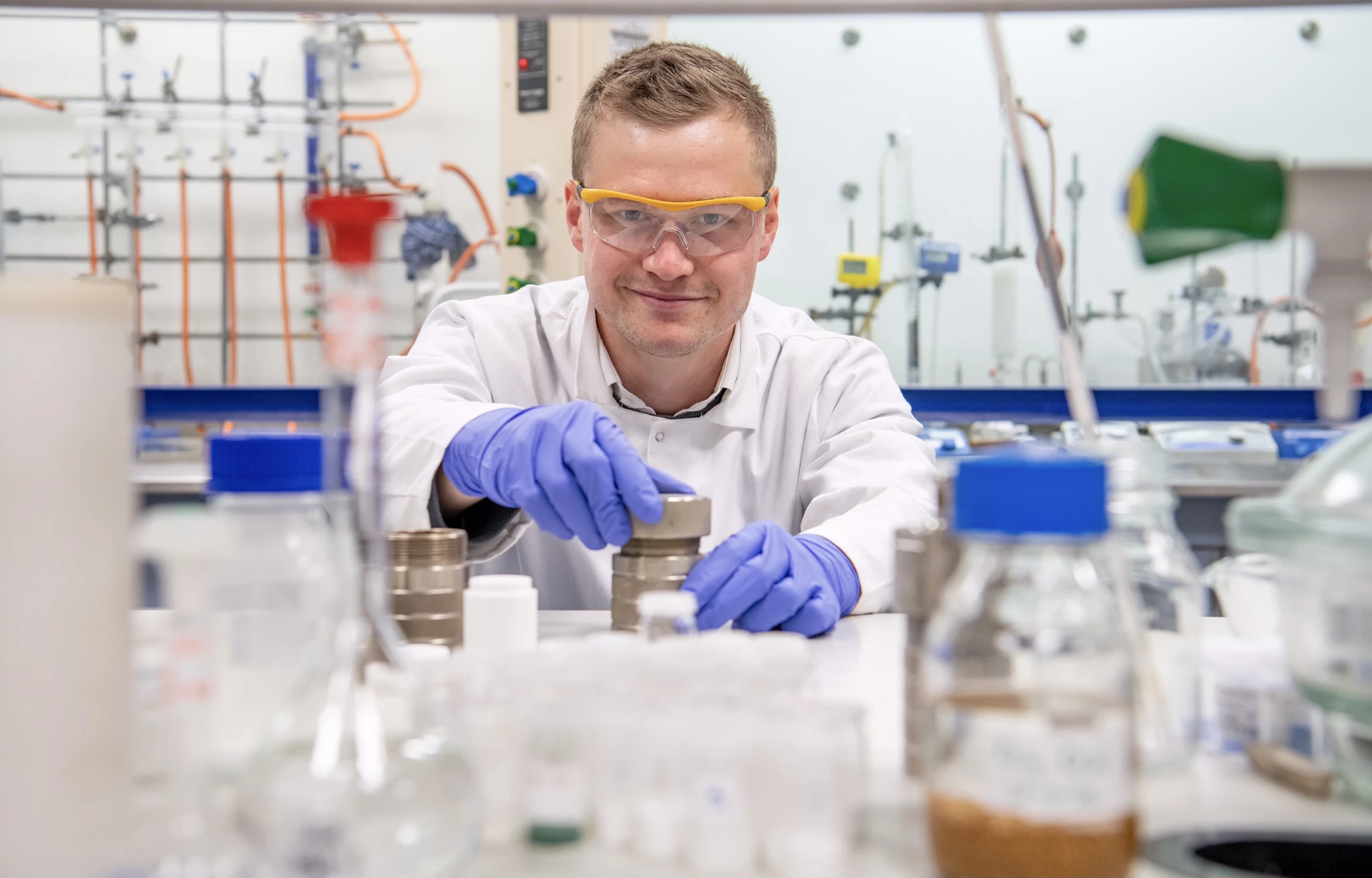
Partner Article
Hybrid catalyst technology key to achieving global net zero emission targets unveiled
A hybrid catalyst platform that efficiently and sustainably converts carbon dioxide into versatile plastic materials has been unveiled. ViridiCO2 is a novel CO2-mitigation solution that can be used to more effectively produce tens of millions of tonnes of chemical products that find ubiquitous use in mattresses, clothing and building installations, while reducing CO2 emissions. It is one of eight of the University of Southampton’s most promising startups that unveiled technologies to make the world smarter, safer and more sustainable as part of the Future Worlds Founders Cohort.
It has been created by Chemistry researchers, Dr. Daniel Stewart and Professor Robert Raja. In the future, the technology could be retrofitted to the output streams of petrochemical refineries to close the carbon loop, representing a major step towards the UK’s vision to bring all greenhouse gas emission to net zero by 2050. It has so far been recognised by the Royal Society of Chemistry (RSC) as a winner of its prestigious 2020 Emerging Technologies Competition.
27-year-old Daniel Stewart says: “Our ultimate goal is to play a pivotal role in achieving global net zero emission targets. Quite simply, we have come up with a process which allows chemical manufacturers to directly replace fossil fuels with carbon dioxide in the production of high value chemicals. Before starting my research, we identified three problems. The first is chemical manufacturing which is responsible for 6 per cent of greenhouse emissions –encompassing 1 billion tonnes of CO2 a year from direct industry emissions alone, and a further 1.8 billion tonnes from heat and electricity production – unimaginable numbers.
“Secondly, chemicals are produced almost solely through fossil fuels but fossil fuels are dwindling so we need to reduce reliance on them. And thirdly, there are 30 million tonnes of polyurethanes produced every year but they are largely non-recyclable. They find use across many commercial sectors and the industry is set to grow $70 billion by the year 2022. In the presence of uniquely designed catalysts, up to 50 per cent of the polyol feedstock mass can be replaced with carbon dioxide.”
The ViridiCO2 platform was produced with research funding from the Engineering and Physical Sciences Research Council (EPSRC) and Daniel attributes much of the company’s success so far to the School of Chemistry and Future Worlds at the University of Southampton.
Daniel adds: “The need for a more sustainable way of living is huge; everyone recognises this but it’s not an easy thing to tackle. A lot of ideas fail because they’re not scalable but we believe our technology is scalable, efficient and economical. We will aim to target chemical manufacturers in the first instance, with the opportunity to impact the founding industries that work in cement, steel and iron as it’s these that produce a further 10 percent of global CO2 emissions.
“At the beginning of my PhD I said to my supervisor that I wanted to do something with high impact, not just for the sake of it. During my research we realised we had created something that worked outrageously well and we ran with it – and then we realised the commercial potential. Chemical scale up in unpredictable but we’re doing everything we can to really make a difference to the world. We’re reaching crisis point and we need to do something and I will be proud to be a small part of that change.”
ViridiCO2 has been one of eight specially selected startups at the University of Southampton which has been working closely together through the Future Worlds Founders Cohort, an intensive programme accelerating startups. They took part in a virtual demo day where they pitched to a network of high impact, early stage investors ready to help launch their ideas into a global market.
This was posted in Bdaily's Members' News section by Katherine Adams .
Enjoy the read? Get Bdaily delivered.
Sign up to receive our popular morning National email for free.








 Navigating the messy middle of business growth
Navigating the messy middle of business growth
 We must make it easier to hire young people
We must make it easier to hire young people
 Why community-based care is key to NHS' future
Why community-based care is key to NHS' future
 Culture, confidence and creativity in the North East
Culture, confidence and creativity in the North East
 Putting in the groundwork to boost skills
Putting in the groundwork to boost skills
 £100,000 milestone drives forward STEM work
£100,000 milestone drives forward STEM work
 Restoring confidence for the economic road ahead
Restoring confidence for the economic road ahead
 Ready to scale? Buy-and-build offers opportunity
Ready to scale? Buy-and-build offers opportunity
 When will our regional economy grow?
When will our regional economy grow?
 Creating a thriving North East construction sector
Creating a thriving North East construction sector
 Why investors are still backing the North East
Why investors are still backing the North East
 Time to stop risking Britain’s family businesses
Time to stop risking Britain’s family businesses